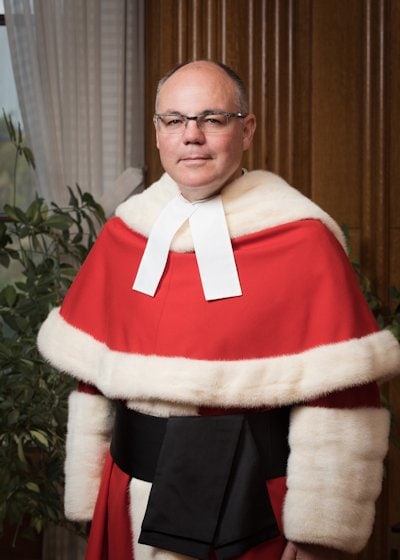Aidan Campbell (2L) and Nick Papageorge (2L)

Nick Papageorge: Let’s get right to the hard hitting stuff. Who is your best friend on the bench?
RB: Rosie Abella. She and I see eye to eye on very little, but she’s been a good friend. I’ve had a lot of good friends on the court, but she’s probably just a nudge above the rest of them.
Aidan Campbell: In some sense, every Supreme Court judge has the same role. But each brings his or her own experiences and background to the bench. Is there anything that you’ve found particularly useful?
RB: Anything in my background? Well, certainly not tort law. We don’t get much tort law. But my experience as an academic has been helpful in the sense of taking seriously what the other side says, which is really, as David Dyzenhaus once told me, the essence of the academic enterprise: taking seriously what the other side says and accounting for it. And so I’ve tried very hard to do that.
I think also part of my academic background that I bring is a willingness to question my own preconceptions about an issue but, at the same time, where I’ve formed a considered opinion, to advance criticisms of other people’s point of view. So, the academic marketplace and war of ideas has informed my work on the court.
And my time as a practicing lawyer also looms fairly large because it seems that a lot of what I’m doing entails tempering the search for principle, which is probably a legacy of my academic inclinations, with an injection of pragmatism. And that’s hard to do. But I’m finding both aspects of my background are helpful that way.
NP: On that topic of competing viewpoints: you’ve written about the value of the dissenting opinion and the role that can play in creating a dialogue between judges. Would you like to see more dialogue of that form in Canadian courts?
RB: One thing I wouldn’t want to see is a return to the competing Master’s dissertations that characterized some appellate judgments in the 1980s. But I do think dissenting judgments are important for several reasons.
First, if the judge simply, in good conscience, cannot subscribe to everything contained in the majority opinion then that judge not just can dissent—the judge must dissent. And so it serves a function in allowing the judge to adjudicate according to his or her conscience as to what the law requires.
A second function of dissents is to put out an alternative view. I think there is a tendency in our national culture to accept, not just to accept, but to regard the pronouncements of the Supreme Court not just as statements of the law but as indisputable statements of the law—and often that’s just not so. Our judgments are the product of judgment calls, and we should make those explicit. When we do that we’ll find, I think, that they aren’t as indisputable as people might have taken them to be. So dissents are useful for the reason that they give voice to that disputed view of the law.
And the third reason dissents are useful, and this is the reason one typically sees, is they might be plucked decades later as a new statement of the law. Chief Justice Laskin’s dissents are notorious for this. An obvious example is his dissent in Rivtow Marine finding new life in Winnipeg Condominium and Bird Construction. So that’s another reason.
And the fourth reason I think dissents are important is that they add clarity to what the law is by expressing a view which does not reflect the law. In other words, you clarify the law by stating what the law is not. And that’s useful, too. I think in some ways majority judgements where there might be some ambiguity are clarified with the help of a dissent expressing a contrary view.
NP: The discovery of your blog posts caused quite a stir. Would you like to see more legal academics and practitioners expressing opinions on law and politics in that manner? Do you think there’s a benefit to the layperson?
RB: I think there is and I think that’s happening. Our role as academics is to bring our learning and our scholarship to bear in a number of ways. I was working in a university where its first president stated the mandate of the university was to uplift the whole people. So, yeah, I think any kind of engagement with the public is a worthwhile enterprise for academics.
NP: You think just for academics, or should practicing lawyers also voice their opinions?
RB: Sure, I mean, within the bounds of professionalism, absolutely. And it’s really sort of exponentiated in the last five or six years. A lot of practicing lawyers have individual blogs or subject-matter blogs. I think it enriches a discourse about legal issues.
NP: On the topic of your blog posts: I think that a lot of people, especially those not in the legal profession, have trouble imagining judges can simply set their personal views aside when it comes to deciding cases. Is that separation something that comes second nature to judges? Or is it something you’re consciously working at and consciously aware of?
RB: Chief Justice McLachlin has spoken about what she calls ‘conscientious objectivity,’ which she describes as trying very hard to put yourself into the shoes of the other person—not just giving it lip service, she says, but really, really thinking about it. And I think that presupposes that it’s an ethical imperative for all judges to consciously try to do that, because we all bring the biases that are the product of our upbringing, of our experience, and are reflected in our considered opinions.
But, the point is that I think you want to make an effort every time to try and see the dispute from the standpoint of every party before you. I think the premise of conscious objectivity is that it’s something judges always have to work at.
AC: On the topic of administrative law, do you think coming from the west changes how you think about the role of the federal government or administrative law generally?
RB: Well, a lot of these administrative tribunals are provincial delegates. And a lot of them are arbitrators under provincial statutes. So it’s not really a ‘west versus the federal government’ thing. It really, I think, probably implicates one’s understanding about the relationship between legislative supremacy and the rule of law in the context of a growing administrative state. And people can have a variety of opinions on that throughout the regions of the country.
AC: Judicial activism is a term that gets thrown around a lot, and it seems the term has come to mean: “Whatever a judge does that I don’t agree with, that’s judicial activism.” Do you have a working definition of judicial activism that you think is useful?
RB: I don’t think it’s a useful term. I pointed out recently in a talk that whether Donoghue and Stevenson is, as some people say, an instance of judicial activism really depends on one’s view of what it did. One might say that it was an instance of judges invoking their policy preference to undo fifty years of law. I might have seen it as an instance of judges restoring centuries of law that had been overridden in the mid-nineteenth century by the policy preferences of judges who were concerned about saddling England’s burgeoning industrial sector with what they thought was undue liability. So I don’t think, because it’s such a subjective term, that it’s a useful term.
I do think that one can have a debate about the role of courts vis-a-vis legislators; one can have a debate, as we often do, about the degree of deference that legislative policy preferences are owed in the face of a constitutional supremacy clause, which obviously engages the courts. In the context of administrative law, as I say, one can have a debate about the role of the administrative state in the context of the dual imperatives of legislative supremacy and the rule of law. It’s probably more useful to, rather than use an overarching term like judicial activism, have more focused debates which are entirely legitimate to have.
NP: What do you personally conceive of as the role of the Supreme Court and the appellate courts in our legal and political order?
RB: Well, the role of the Supreme Court is to—the same as any other court, in one sense—adjudicate disputes and to settle the law. And it does so in cases of national importance, or in cases where parties have a statutory right to bring that question to the Supreme Court. It differs in that respect from provincial courts of appeal, which have important legal development roles as well, but are also courts of error correction. We’re not a court of error correction.
One of the interesting questions that I think we need to consider in the next decade is: What is the role of provincial appellate courts? We’ve restricted their scope for correction in a number of respects through the standard of review and through particular instances of the standard of review, such as the interpretation of a contract.
I think they have an important role in legal development, but I think we need to flesh out that role more clearly, and we might need to be more mindful of it as we continue to develop the law on standards of appellate review.
NP: Your rise to the Court has been described as “meteoric.” After a decade in academia you were appointed to the trial level, then to the appellate level a year later, and then to the Supreme Court a year after that. Did you have any inclination at that first appointment that this was in the cards?
RB: I thought it might be something I’d want to do. And it was. The Supreme Court appointment came as a surprise, and the proof of that is just a few weeks before I’d launched a big landscaping project in my front yard, which delayed the sale of our house by some time in Alberta. I was very happy with my life in Alberta. It felt like home in a way that even my original province of British Columbia never felt. So I had no ambitions to leave it, and I still miss it.
But, no, the Supreme Court never occurred to me. The other two levels of courts sounded like things I wanted to do. I’m happy to be at the Supreme Court and, at the risk of sounding sort of maudlin, I’m honoured to be among my colleagues deciding the issues that are put in front of us. But it was never something I aspired to.
Editor’s note: this interview has been edited and condensed.






